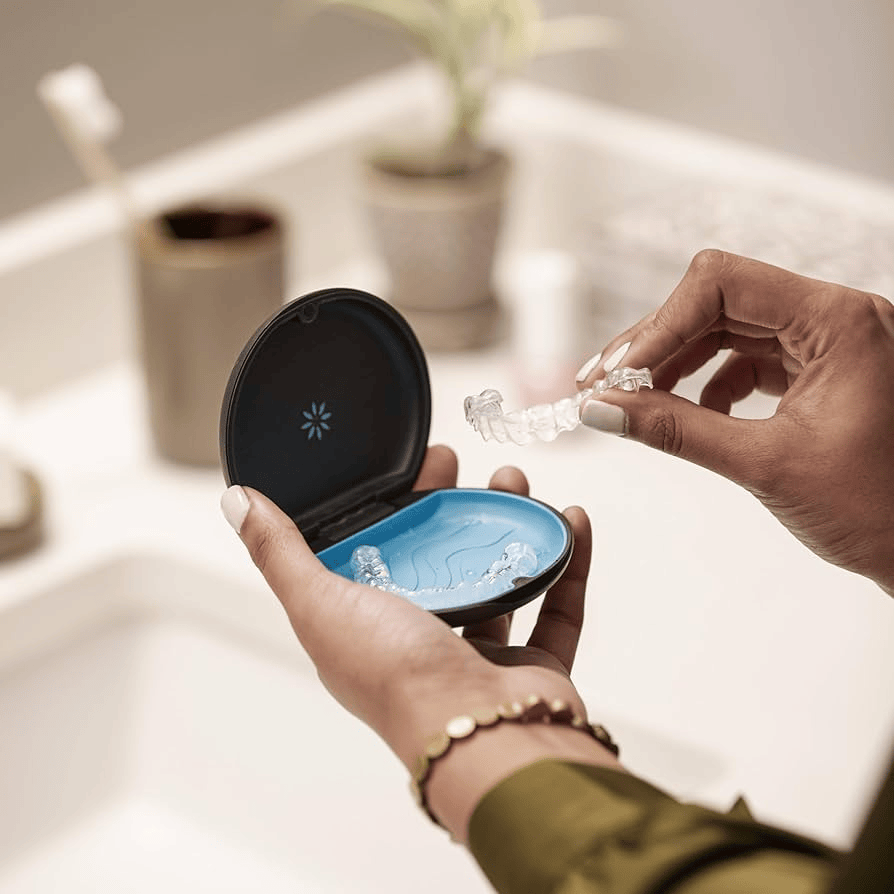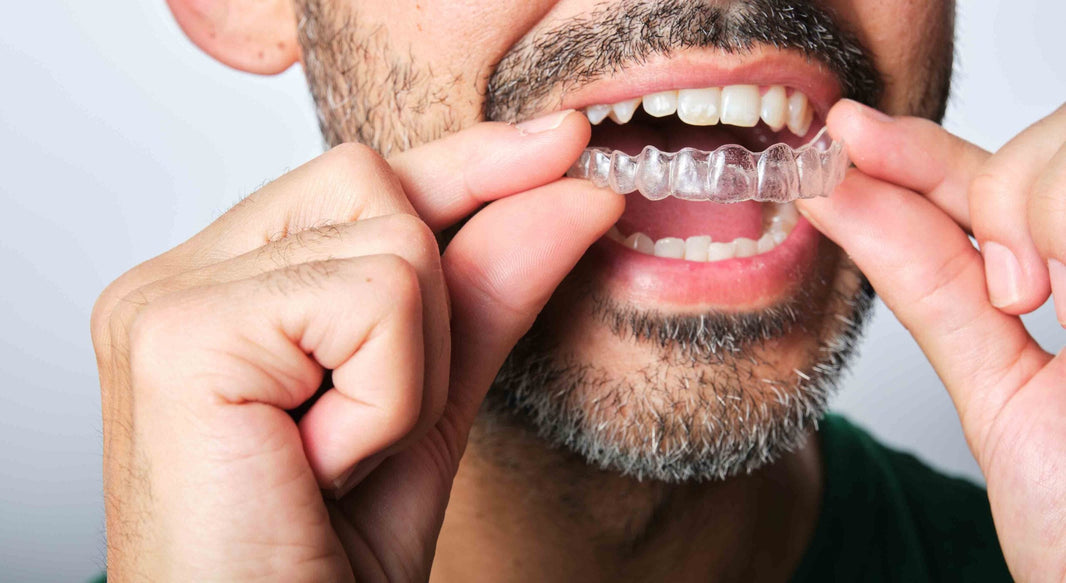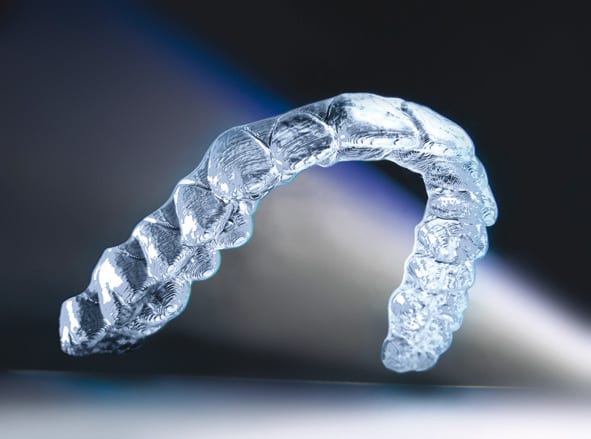When it comes to choosing the right dental protection, understanding the differences between an occlusal guard and a sports mouthguard is essential. Whether you're managing bruxism, dealing with sleep-related clenching, or gearing up for high-impact physical activity, each type of mouthguard serves a distinct purpose. Their construction, fit, and intended use vary greatly—and selecting the wrong one can lead to unnecessary discomfort or even increase your risk of oral injury. This guide breaks down their uses, designs, and health benefits to help you make an informed choice for your dental well-being.
Table of contents
Understanding Bruxism and Occlusal Guards for Sleeping
What Is an Occlusal Guard Night Guard & How It Works?
An occlusal guard—also referred to as a nightguard, bite guard, or dental guard—is a custom-made dental appliance designed to be worn during sleep. Its primary function is to protect your teeth from the repetitive force of clenching and grinding, clinically known as bruxism. Left unaddressed, bruxism can cause enamel erosion, chipped teeth, jaw discomfort, and even chronic migraines. The occlusal guard cushions the teeth, reduces muscular strain, and helps protect the temporomandibular joint (TMJ) from long-term stress and degeneration. By minimizing direct contact between the upper and lower teeth, it provides a critical barrier against damage.
Key functions of an occlusal guard include:
Preventing direct tooth-to-tooth contact to reduce enamel wear and fracture risk
Distributing pressure evenly across teeth to reduce TMJ strain
Helping relieve related symptoms such as jaw tension, facial pain, and morning headaches
Improving overall sleep quality by minimizing clenching noise and disruptions
How Bruxism Damages Teeth Without a Bruxism Mouth Guard
Long-Term Risks Without a Night Guard for Teeth Grinding
Chronic bruxism exerts significant force on the teeth and supporting structures, leading to a range of complications over time. Continuous grinding can cause enamel to thin, increasing tooth sensitivity and leaving teeth more prone to decay. In severe cases, the stress can lead to fractured crowns, worn-down bite surfaces, and gum recession. These outcomes often require expensive and invasive restorative procedures, including fillings, veneers, or dental implants. Addressing bruxism early with an appropriate occlusal guard is essential for preventing irreversible damage.

TMJ Mouth Guard Relief: The Bruxism–TMJ Connection
There is a strong correlation between nighttime grinding and the development of temporomandibular joint disorders (TMD). The clenching motion places constant pressure on the joint that connects your jaw to your skull. Over time, this can cause joint inflammation, restricted movement, pain during chewing, and clicking or popping sounds. By wearing an occlusal guard, the mechanical strain on the TMJ is reduced, allowing the joint to rest and heal overnight.

Custom vs OTC Night Guards for Teeth Grinding
Occlusal guards are available in both over-the-counter (OTC) and custom-fitted forms. OTC models—often marketed as "boil-and-bite" or "one-size-fits-most" guards—are readily available at drugstores but offer limited durability and inconsistent fit. Custom occlusal guards, fabricated by a dentist using digital scans or dental impressions, provide a precise and comfortable fit tailored to the patient’s bite. These professionally made versions are often more durable and effective, especially when prescribed as an occlusal guard hard appliance full arch, which covers all upper or lower teeth.
Custom Night Guard Fit for Better Sleep
Comfort and retention are critical when wearing a nightguard. A poorly fitted guard can shift during sleep, cause irritation, or even exacerbate jaw tension. Custom occlusal guards are shaped to the unique contours of your mouth, ensuring that they remain in place without disrupting your sleep. They are particularly beneficial for individuals with severe bruxism or sensitive gums, offering both protection and ease of use.
Occlusal Guard Cost & Insurance
The cost of a custom occlusal guard typically ranges from $300 to $800, depending on materials, fabrication method, and dental provider. Custom guards last longer, offer superior protection, and reduce the need for costly dental repairs. In many cases, dental insurance will partially cover the occlusal guard price, especially when prescribed for medically diagnosed conditions like bruxism or TMJ dysfunction.

Protective Role of Custom Sports Mouthguards
Impact Absorption with a Sports Mouth Guard
A sports mouthguard—sometimes called an athletic gum shield or sports bite guard—is a thick, resilient appliance worn during training or competition to protect the teeth, lips, tongue, and jaw from sudden impacts. Built from shock-absorbing polymers, it cushions blows to the face and distributes force across a broad surface area rather than allowing it to concentrate on a single tooth or joint. This protective layer significantly lowers the risk of chipped or avulsed teeth, jaw fractures, and lacerations to soft tissues. By acting as a flexible buffer, a high-quality sports mouthguard also helps stabilize the mandible, which can minimize the likelihood of concussion-related forces traveling from the chin to the skull.
Stock vs Boil-and-Bite vs Custom Mouthguards
Sports mouthguards fall into three main categories: stock, boil-and-bite, and custom-fabricated. Stock guards are inexpensive and pre-formed, but their one-size-fits-all design offers minimal retention and can impede breathing. Boil-and-bite models improve on this by softening in hot water and molding to the athlete’s dentition; however, they still compress over time and may lose their shape. Custom mouthguards—fabricated from digital scans or dental impressions—deliver the best balance of comfort, speech clarity, and impact resistance. Because they precisely match the athlete’s occlusion, custom guards stay in place even during intense play, providing reliable protection without distracting bulk.
Fit & Comfort: Custom Mouth Guard vs Stock Bite Guard
Custom Mouth Guard Solutions for Sports & Bruxism
PLACEHOLDER: One of the standout benefits of the iTero Element™ scanner is its speed. A complete iTero scan typically takes only 5 to 10 minutes to perform, depending on the complexity of your case. That’s significantly faster than traditional putty impressions, which require drying time and often multiple attempts to get right. With iTero, your orthodontist can capture and review your scans immediately—providing instant feedback and allowing you to preview your future smile during your very first consultation.
Key differences in fit and design include:
- Occlusal guards use slim, high-density materials to maximize overnight breathability and reduce bulk while sleeping.
- Sports guards employ thicker, multilayer construction to dissipate collision forces and shield soft tissues.
- Custom fabrication ensures both types conform to individual bite anatomy, preventing slippage and gagging.
- Poorly fitted devices can create pressure points, aggravate TMJ symptoms, or provide inadequate impact absorption.
- Routine check-ups are crucial; dentists can adjust or replace worn guards before they compromise protection.
Night Guard Cleaner & Hygiene for Long-Term Use
Because mouthguards sit against teeth and soft tissues for extended periods, they quickly accumulate bacteria, plaque, and odors. A consistent cleaning routine preserves the appliance’s integrity, prevents discoloration, and safeguards oral health. Ideally, every user should treat a night guard or sports mouthguard like a toothbrush—rinse immediately after use, clean thoroughly at least once daily, and store in a ventilated, protective case.
Choosing the Best Mouth Guard for Sleeping or Sports
Choosing between an occlusal guard and a sports mouthguard begins with an honest assessment of daily activities and clinical needs. Individuals struggling with nocturnal grinding, clenching, or TMJ discomfort will benefit most from a custom occlusal guard designed for sleeping. Athletes in contact or high-velocity sports, however, require a robust sports mouthguard engineered to withstand sudden impacts. In some cases—such as an athlete who also grinds at night—both devices may be necessary to provide round-the-clock protection.
Key factors to consider when choosing a mouthguard:
- Determine whether the primary risk is chronic (bruxism, TMJ) or acute (sports collisions).
Prioritize fit and comfort; custom guards outperform boil-and-bite or stock options for both sleep and play.
Evaluate durability and material thickness relative to usage frequency—nightly wear demands different properties than occasional game-day use.
Seek a professional assessment; a dentist can recommend the correct guard type and verify that it meets safety standards
Cleaning a Bruxism Mouth Guard vs a Sports Mouthguard
Although both devices require diligent hygiene, their cleaning protocols diverge slightly. Sports mouthguards, exposed to sweat, dust, and on-field debris, need frequent disinfection to control pathogens. Occlusal guards, worn in a warm, saliva-rich environment overnight, benefit from gentle daily cleaning to remove plaque films and prevent odor.
How to Clean a Bruxism Night Guard
A bruxism mouth guard should be rinsed each morning, brushed softly with non-abrasive toothpaste, and allowed to dry thoroughly. Weekly soaks in an effervescent denture tablet or a 1:1 vinegar-water solution neutralize bacteria and dissolve mineral deposits without degrading the material.
Daily and weekly care tips for your occlusal guard:
Rinse with lukewarm water after removal each morning.
Brush with a soft toothbrush and gel-based, non-whitening toothpaste.
Soak once a week in a specialized cleaner or diluted white vinegar to disinfect.
Air-dry completely and store in a ventilated, hard plastic case.
How to Clean a Sports Mouth Guard
Given its exposure to locker-room surfaces and outdoor environments, you should rinse your mouthguard immediately after play, then brush with mild soap or toothpaste. Soak the guard once a week in a non-alcoholic antimicrobial rinse to eliminate deeper contaminants.
Sanitation tips for maintaining your sports mouthguard:
Rinse with cool water right after each practice or game.
Brush gently with a toothbrush and mild, non-abrasive cleanser.
Disinfect weekly in an alcohol-free mouthrinse or specialized appliance soak.
Inspect often; replace guards with cracks, tears, or excessive wear.
What is the difference between occlusal guard and mouth guard?
Although they look alike, an occlusal guard is made from a thinner, smoother plastic that’s comfortable enough to wear while sleeping. You can have one fabricated precisely by your dentist, pick up a boil-and-bite version at the pharmacy, or order an online kit. By contrast, a standard athletic mouthguard is bulkier and built primarily for high-impact protection on the playing field.
What is the difference between a night guard and a sports mouth guard?
Night guards use a softer, more flexible material that cushions the teeth against overnight clenching and grinding. Sports mouthguards are formed from a denser, shock-absorbing plastic that can withstand sudden blows during competition. Each guard is engineered for a specific risk—chronic grinding versus acute impact—so their construction and resilience differ accordingly.
What is the best type of mouth guard to use?
A dentist-made, custom-fitted guard is the gold standard. Because it is molded from an exact impression of your teeth, it delivers unmatched comfort, stays securely in place, and provides the highest level of defense—whether you need it for bruxism, TMJ relief, or contact sports. While the price is higher than store-bought options, the fit and longevity usually justify the investment.
Can I use my night guard for sports?
It’s not advisable. Night guards are built for low-impact, overnight use and lack the bulk and shock absorption required for athletic collisions. Relying on a night guard during sports could leave you vulnerable to dental or jaw injury; instead, choose a purpose-built sports mouthguard for on-field protection.
Conclusion
Occlusal guards and sports mouthguards each serve a vital yet distinct role in comprehensive dental protection. A custom night guard shields teeth from the relentless forces of bruxism and alleviates TMJ stress while you sleep, whereas a well-fitted sports mouthguard absorbs impact energy and prevents trauma during athletic competition. By understanding their unique designs, maintenance requirements, and usage scenarios, you can choose the guard that best aligns with your lifestyle. Invest in the right device, keep it impeccably clean, and consult your dentist for regular evaluations—your smile, jaw health, and overall well-being will reap the benefits for years to come.






